Pioneer Square. It is one of Seattle’s oldest neighborhoods, a fabled precinct with a century-plus history of boom and bust, decline and renewal. And the hopeful folks behind People in the Square, a new musical making its debut this month (through Aug. 27) are pondering its past and present. The show takes place in the New Skid Road Theatre — a flexible performance space inside the Good Arts Building that has rebranded and resurrected the old Skid Road Theatre for its first evening show in nearly 40 years.
The jaunty, sometimes corny, but informative and entertaining romp through Pioneer Square features an energetic quartet of professional singer-actors and a live band. The 65-minute, cabaret-style revue includes original and sincere odes to the Duwamish people (hailed in the ballad “Princess Angeline,” a paean to the daughter of Chief Seattle), as well as upbeat, spoofy numbers like “The Coffee Canticle,” which satirizes the near-religious fervor Seattle has for its beloved java.
But will an audience come? Or will negative perceptions about Pioneer Square, stoked by pandemic-related closures, persistent homelessness and concerns about crime keep locals and tourists away?
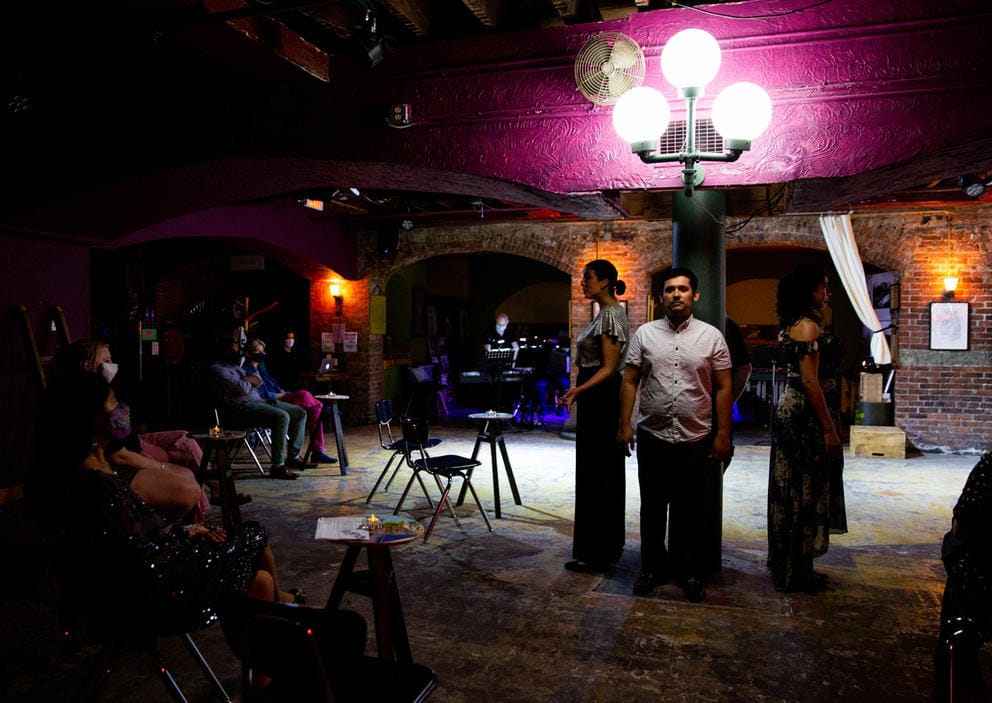
Actors Lorena Del Pino, Jack Mozie and Viviana Garza perform in “People in the Square,” a cabaret-style musical at the New Skid Road Theatre in Pioneer Square. New theater lights and traditional touches like globe lights were added during renovations to help create a dramatic atmosphere. (Lindsey Wasson/Crosscut)
The director-writer Rose Cano and composer David Nyberg (partners in Creative Hiatus Productions) are Seattle natives and former schoolmates at Seattle Preparatory School. They are old enough to recall when Pioneer Square was a bustling entertainment hub with inviting music clubs, open-late eateries, art galleries and theaters.
Cano recalls, for instance, seeing shows while still in her teens at the previous incarnation of Skid Road Theatre, which was a popular performance space for musicals and contemporary plays in the 1970s and early ’80s. And, later, she frequented the other neighborhood venues of that era: the Pioneer Square Theatre (which closed in 1989) and the Empty Space Theatre (which operated there for several years before moving to Fremont).
Nyberg and Cano believe, now that people feel more comfortable about gathering, it may be time for another nightlife resurgence. “We want to be part of a revival of this community,” says Cano, whose day job as a Spanish language translator for Harborview Medical Center includes a weekly stint at the Pioneer Square Clinic.
She notes a convergence of cultures and backgrounds in the picturesque neighborhood that is unique to the city — from those who can afford pricey cocktails at establishments such as Nirmal’s and Damn The Weather, to the low-income residents in the area’s subsidized apartments and the indigent people who depend on the Union Gospel Mission and other shelters for a bed and a meal.
“As an artist, those contrasts and contradictions interest me,” says Cano. “Our show asks, ‘Whose Pioneer Square is this?’”
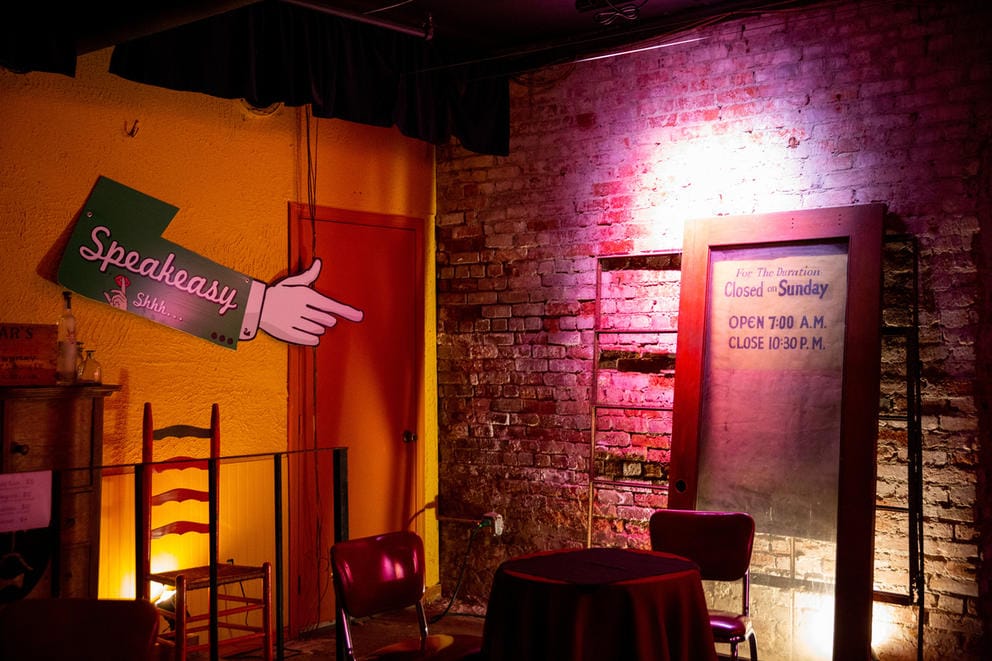
The scene at the Beneath the Streets underground tour, which in the evenings has been turned into the New Skid Road Theatre for the run of “People in the Square.” (Lindsey Wasson/Crosscut)
The musical (presented with support from Trial and Error Productions) imparts how Pioneer Square as we know it today, with its charming brick buildings and old-fashioned storefronts, dates back to the 1850s. That’s when European-American settlers established it as Seattle’s first downtown, where Henry Yesler opened his steam sawmill and wharf. The timber he processed was logged from the forested hills above, then dragged and skidded down the slope to the mill. Hence the term “Skid Road” (or Skid Row) — which local lore (but not all historians) claims as a Pacific Northwest invention.
Seattle history isn’t just presented on stage here, but all around the audience, as the theater shares space with Beneath the Streets, a popular underground tour that since 2013 has leased the old Skid Road Theatre space during daytime hours for its atmospheric excursions through the city’s subterranean history.
Patrons walk down a flight of stairs into the cellar-level theater (note: it’s not wheelchair accessible) and sit at cafe tables and benches in the performing area. (In a nod to those still anxious about attending a performance in this stage of the pandemic, capacity is limited to 35 people at socially distanced tables.)
Audience members are surrounded by Beneath the Streets’ fascinating collection of historic Seattle photos and memorabilia, including vintage maps and curios, as well as a colorful banner advertising a long-ago Skid Road Theatre production of the Broadway musical about Wild West sharpshooter Annie Oakley, Annie Get Your Gun.
It all seems apropos for the nods People in the Square gives to the devastating Great Seattle Fire of 1889, the Klondike Gold Rush (which swelled the population and wealth of the city), and the curious saga of (and controversy over) the Pioneer Square totem pole, also known as the “Chief-of-All-Women-Pole.”
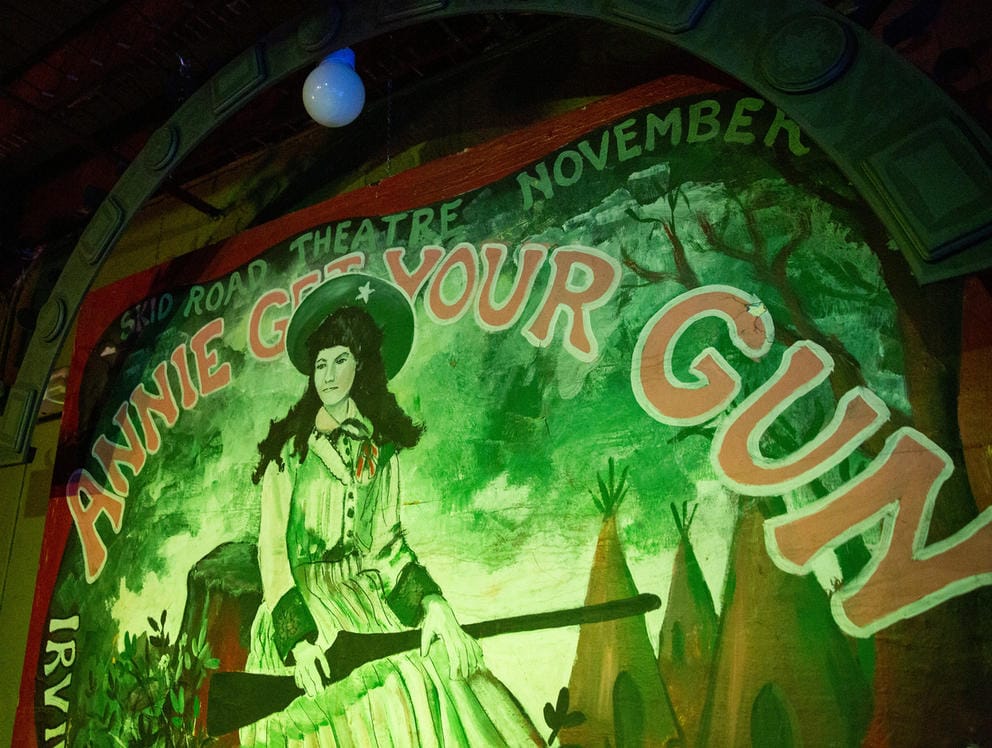
The shared performance space inside the historic Good Arts Building includes old photos and memorabilia, such as this poster for "Annie Get Your Gun," a production at the old Skid Road Theatre. (Lindsey Wasson/Crosscut)
Lisa Howard, executive director of the nonprofit Alliance for Pioneer Square, which advocates and oversees civic improvements in the area, welcomes cultural additions like the new musical. She also is pleased that some of the area’s hardy arts purveyors have hung in there during the pandemic, including Café Nordo, the unconventional dinner theater and multi-arts emporium, located at the former site of Elliott Bay Book Company.
Howard acknowledges the pandemic hit Pioneer Square hard — particularly the eatery and entertainment trade. “We have a comparatively low residential base,” she points out. “The large workforce that worked in offices and other businesses here stayed home.” Not to mention the fact that tourism was down and many sports events were canceled at nearby Lumen Field and T-Mobile Park.
“We lost so much foot traffic,” Howard says, “and as a reflection, the street crime was up. And there is a lot of visible homelessness all around the downtown area.”
But Howard, whose organization also promotes new business and advocates for historical preservation, is a Pioneer Square booster with a message to those who might be inclined to avoid the district at night.
“A lot of what I hear about Pioneer Square right now doesn’t necessarily reflect the day-to-day experience we’re having. Once people take that leap to have dinner in one of our new restaurants, or take in a show, it’s a lot different than they thought.”
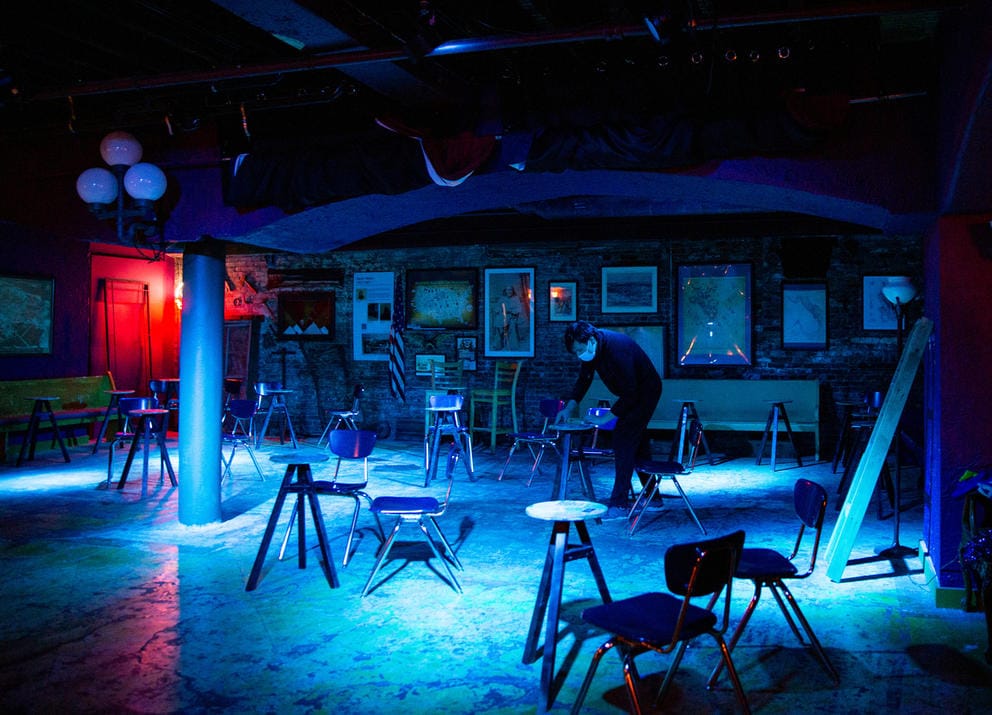
Stage manager Eric Wu sets up and cleans tables while working to transform the Beneath the Streets underground tour space into the New Skid Road Theatre in the evenings. (Lindsey Wasson/Crosscut)
On some evenings, the neighborhood feels once again full of art-goers. The monthly First Thursday Art Walks are back, after a pandemic hiatus, and last month the Seattle Art Fair brought in throngs of visual art fans to the area to peruse works by artists from around the world.
The historic Good Arts Building aims to bring more arts patrons to the neighborhood. Built in 1889 at First Avenue and Cherry Street and originally called the Scheuerman Block, it formerly housed department stores, a jazz club and a diner called Good Eats, among other establishments.
Now it’s run by Good Arts LLC, along with preservation group Historic Seattle, and includes two floors of artist studios (managed by artists Jane Richlovsky and Steve Coulter). At street level, the Cherry Street Coffee House has been a mainstay for espresso lovers since 2017. And this past March, the building welcomed a new literary tenant: Open Books, a poetry bookstore relocated from Wallingford.
The Alliance’s community development director Chris Woodward doesn’t downplay the concern for safety visitors may have. “At the end of the day, Pioneer Square is an urban environment, and you have to be aware of your surroundings, and take some precautions,” he says.
“All that said, there are good public and private investments on the way, like the Alaskan Way redevelopment project that should bring in more foot traffic,” Woodward says. “The city has been engaged in a year-long process with us to allow for the working waterfront elements to stay in place — the ferries, the ports — but to also improve pedestrian access and create a public space down there, with green plantings, a habitat beach and a historic boat landing.” He also points to the chic new high-rise CitizenM Hotel on Yesler Way.
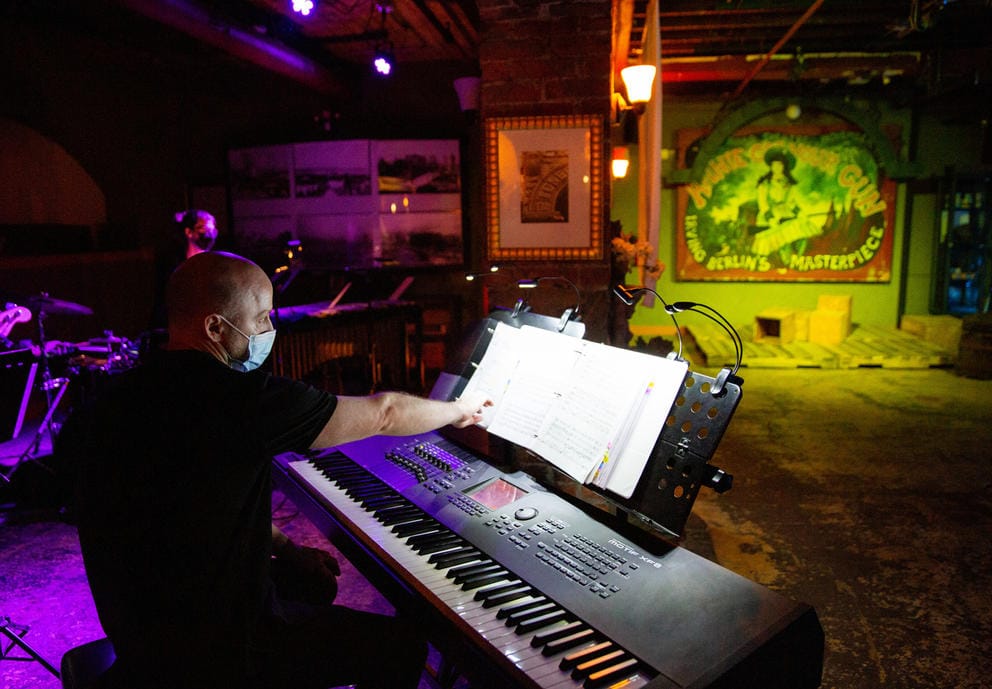
Musical director Brandon Peck looks through sheet music as the band sets up while preparing for a performance of “People in the Square” at the New Skid Road Theatre in Pioneer Square. (Lindsey Wasson/Crosscut)
Among the renewed nightspots is Central Saloon, a longtime music emporium that claims to be “the birthplace of grunge” (yes, Nirvana and Soundgarden played there). The club owners recently secured the venue’s future by purchasing the building that houses it, and it’s still rocking in Pioneer Square.
Seth Howard, owner of the long-running Collins Pub, says about 50% to 75% of his tourist patrons have returned, and 100% of sports fans (thank you, Seattle Mariners). But that doesn’t account for all of his customers. “This restaurant is driven by office workers,” he says. “Many of those people are still in their pajama pants working from home. I’m only seeing 30% of my previous office worker business, a far cry from the 100% I need.”
Established as a national historic district in 1970, Pioneer Square is likely to maintain its well-preserved architecture and tree-lined streets and plazas — even as development continues throughout the city. And thanks to the established social services in the community, low-income people are less likely to be squeezed out by gentrification.
“Because of the low-income housing, Pioneer Square is the backyard for those residents,” notes Woodward. “They’re in our community, they’re our neighbors.”
That attitude is shared by the creators of People in the Square. Alongside the tunes about the neighborhood’s early days there are songs and skits about contemporary Pioneer Square, such as “The Craft Cocktail Calypso,” about the drinks at au courant watering holes, and “Fan Frenzy,” about today’s rabid sports aficionados. But in a more serious vein there is “Mambo for the Day Laborer,” which sympathetically portrays men on the street who are “living in the missions and looking for work.”
If business is good, the creators hope to bring the show back on an annual summertime basis. And summer is the ideal time for those skittish about visiting Pioneer Square at night to see a performance, points out Nyberg: “When the show lets out, it’s still light. We did that on purpose.”
Crosscut’s arts and culture coverage is made possible in part thanks to support from the Seattle Office of Arts & Culture.




